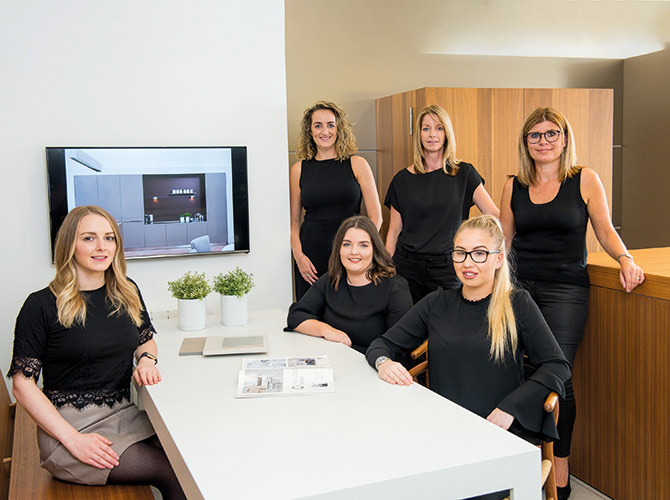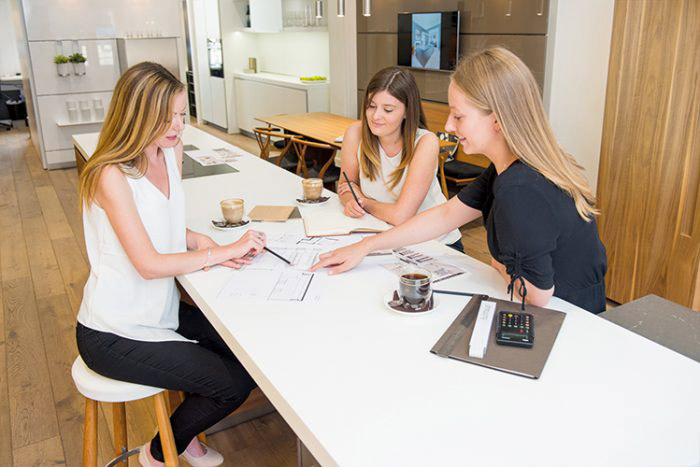Cameron Interiors recently become the first UK employee-owned kitchen retail company. Vicki Evans speaks to MD Kirsten Robeson and Edinburgh studio manager Louise Delaney about how the company’s person-centric, and detail-oriented ethos has helped it go from strength to strength
When business owners decide they want to take a step back or sell their company, there are a few options.
One is to sell the business to an employee, which is how Kirsten Robeson became the owner of Cameron Interiors in 1993. She bought an established business from founder Leonard Cameron, who started the company in 1979.
Another way is to sell to a third party, but it usually means that things change within the company.
A third option is employee ownership, which most people associate with John Lewis, but it is a fairly new concept for the UK. Employee ownership is where all employees are given a financial stake in the company and a say in how it is run. And, when owner Robeson and husband Ian decided to take a step back from running the business this quickly became the best option for them and Cameron Interiors.
Robeson needed to make sure the company remained the same for the sake of both customers and employees. She will stay at the company part-time and is a member of the board of trustees with Louise Delaney, the Edinburgh studio manager, and an independent trustee.
“We didn’t want to change the company, for the people who worked there or for our clients,” Robeson explains. “We have loyal clients who have worked with us for 40 years – they have come back even with their children who now need renovations. We didn’t want any change. We wanted the company to continue what it was doing as it was doing well.”
After doing all the research into employee ownership, Robeson has become a massive convert. It does require having a good team behind you that will take on the responsibilities and whom you trust, but with a team as strong as Cameron Interiors that was not an issue.
“If you have the right team and can afford to do it, it is a great way of passing the business on to other people,” says Robeson. “I was able to get Cameron Interiors when Leonard Cameron retired. I now have the opportunity to pay that forward to my staff.”
Employee ownership became official on December 8, 2020, but, as for many, it was a year of ups and downs. It was important to Robeson that the staff were looked after. No one left the company during that year and everyone – even while they were briefly on furlough – received 100% of their salary.
Person-centric
The original Cameron Interiors showroom is in Glasgow. It is the main HQ and it has many kitchen displays of various styles, as well as bedroom and office furniture. The Edinburgh studio is smaller. It is designed to look more like a house than a showroom and just has kitchen displays in the old Georgian building.
People are at the forefront of everything at Cameron Interiors. It is a person-centric business that focuses on customers and treats its staff like individuals. There are 12 staff with three working from Edinburgh, six from Glasgow plus the warehouse team.
Delaney explains the employee culture, she says: “It sounds cheesy, but it is a work family. We interact with our clients from the design side first, and we see everything through from start to finish. It allows us to have a relationship with the client.”
It was apparent on the Zoom call with Robeson and Delaney how much they respect and appreciate each other’s talents and value their employees. Robeson admitts that she would never have been able to pass the company over without this team.
A Cameron Interiors employee is not a jack-of-all -trades because they have to be a master of them all. Robeson explains: “It is hard for us to find the right person as we want someone to be everything. To be a designer, be able to project manage, look at the detail and technical aspects. We need someone who is great with clients but can also sell.”
Employees are often recruited from the design sector and they advertise at colleges. The company takes on many juniors and builds them up the ranks like Robeson, who joined from college, but then some have previous design experience, like Delaney.
The whole team is continually being developed using various training courses, both in house and with suppliers. There are always opportunities for people to learn more, especially in an industry with constantly evolving trends and new products.
Delaney talks about the collaborative nature of the job and how everyone learns and helps each other out. She says: “It is an industry where you can never know everything. You can’t get bored because there is always something new.”
One point that keeps coming up is being detail-oriented. Clients comment on how they are listened to at design appointments and how their designers use these conversations to help them build a fully bespoke and usable space.
The staff also feel listened to as the whole company is very collaborative, and people can get involved with different aspects of the business. Delaney said: “We are also collaborative and people like to be involved even with marketing and other aspects of the business. Everyone feels like they can be involved with that. Everyone has a voice, and that is a good way of keeping people.”
Approachable and high-end
The company is classy but never snobby. We all remember that Pretty Woman scene where the Julia Roberts character was rudely kicked out of the high-end store as the sales assistant believed she didn’t have the money to shop there. Despite the fact she had plenty of cash to splash on new clothes. Robeson describes this as the absolute worst thing their business could be like.
“Being a Bulthaup dealer, we are at the top end of the market, but we never want to suffer from Pretty Woman syndrome,” she says. “I hate the mentality of not letting someone in because you think they don’t have enough money.”
The company has a split of around 50:50 between retail and the contract market. Even with the developers they work with, it is not about volume, but working with luxury architects and designers to build kitchens in smaller developments.
The company is friendly and approachable but also high-end and sophisticated. The best way of getting a feel for this is by looking on their Instagram page that perfectly shows this balancing act.
Between the professional photos of sleek and elegant kitchens, there are more individual posts about the team working in the showroom or their pets, recipes and installer photos. The mix of personality and professionalism shows that they can be both high-end and personable.
Robeson explains the conundrum. “We have to be careful not to devalue ourselves and make sure that we stay at that top end and be aspirational. We have a very demanding client base, be that a retail client or developers or architects. We look for people who listen and understand the detail.”
Finding that balance can be tricky, though, as the company and products are at the high-end of the market. Bulthaup itself is known for being a mix of high-quality, German craftsmanship combined with on-trend kitchen designs. Therefore, a kitchen from Cameron Interiors is aspirational and not for the mass market but, as Robeson points out, there is no reason why they can’t be friendly at the same time.
Robeson adds: “I hate the thought of people coming to us and thinking that we won’t be nice people. We are nice people. We try to be approachable. Being the owner, I never thought that I was better than anyone else as I think that we all are on the same level.”


